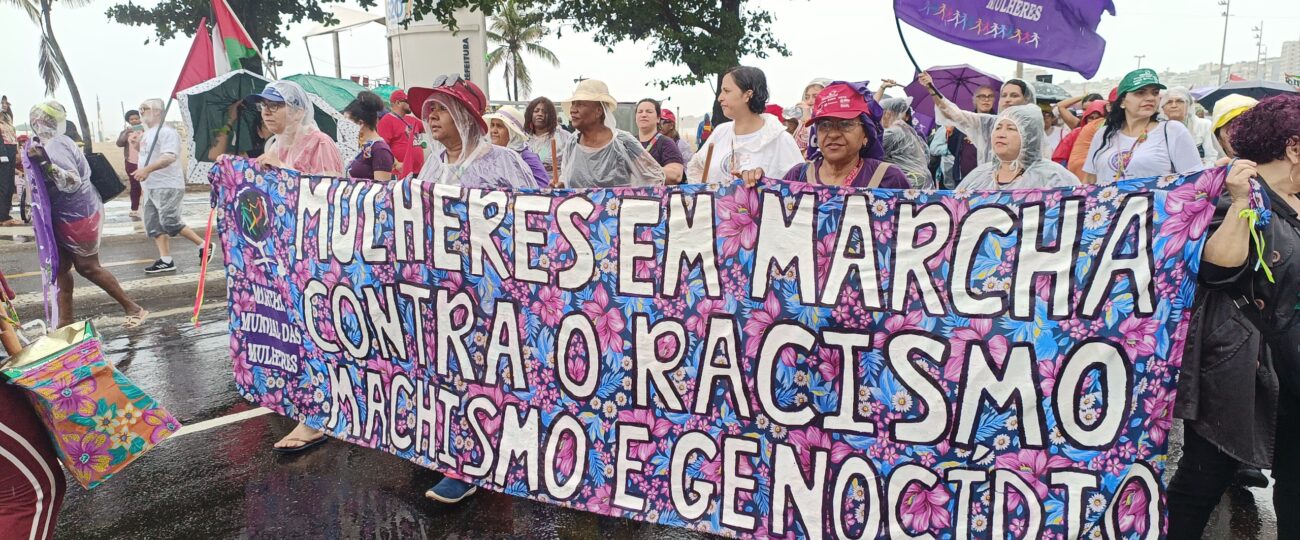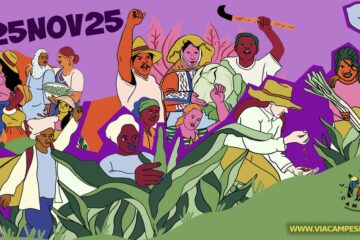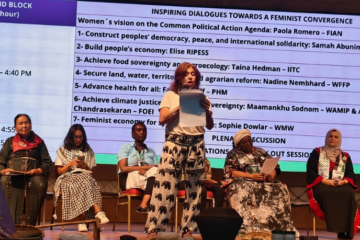The G20 was formed when the G7, a group of the world’s richest countries, realized it could not tackle the global financial crisis of the 1990s. In that context, the G7 proposed involving other countries to address the crisis of capitalism. Instead of strengthening multilateral institutions, democratizing their financing, and imposing restrictions on unrestricted financial flows, the leaders of these nations opted to expand the group slightly to gain more legitimacy in negotiations deemed necessary to hold capitalism together.
At this year’s G20 meeting, the Brazilian government, responding to demands from social movements, pushed for a profound fiscal reform, starting with taxing the super-rich. This taxation is not only essential but also a stepping stone to consider other proposals, such as identifying and revoking corporate tax benefits in our countries—for instance, pesticides are not taxed in Brazil.
Beyond the fiscal agenda, the agenda of climate change also took center stage. For many years, the World March of Women has emphasized that tackling the root causes of climate change requires rejecting false solutions to what triggers the climate crisis—namely, the financialization of nature. Again, this ties into fiscal issues, as discussions always revolve around financing.
Those who advocate for false solutions claim it is possible to finance processes to mitigate the effects of climate change while relying on populations’ resilience to adapt. How is this financed? Climate negotiations have increasingly leaned on compensation mechanisms. Under this logic, companies continue operating as usual, offsetting their destruction by purchasing carbon credits for afforestation, restoring degraded areas, or implementing technological changes to reduce greenhouse gas emissions.
Adding to this is the issue of hunger. The major agreement among multilateral institutions has been an agenda to address inequalities by 2030. As 2030 approaches and goals remain unmet, deadlines are being extended to 2050—a time horizon far too long, as those who are hungry cannot afford to wait. The absurdity of living on a planet where so many people experience hunger is closely tied to issues of food access and production.
A vast expanse of land is not used to produce good food for people but for agrofuels and grains that animals will eat in far-off countries. In this model, energy efficiency is extremely low. Areas that could be generating food for local communities are instead producing soybeans to feed pigs on the other side of the world. And where will those pigs end up?
Hunger is often used as a justification for intensifying productivity, but this intensification fails to solve the problem and quickly creates additional issues. It overlooks the degradation and contamination of soil and water, perpetuating hunger. We call for a review of this production, distribution, and consumption system that exacerbates global hunger.
During the G20 meeting, we, as social movements, also gathered to present our history of discussions and counterpoints. Hunger is one example of how global decision-making, labeled “global governance,” operates—the idea that countries influence one another to make decisions. Decisions that ought to prioritize the common good of people and nature instead serve the interests of multinational corporations and the super-rich.
Connected Demands
We argue that access to food and food production cannot be addressed without discussing the underlying model. We reaffirm the importance of fighting for food sovereignty, linked to the struggle for climate justice and fiscal justice. Often, people lack access to food because their resources are consumed by external debt. External debt places countries in a subservient position, under pressure from transnational corporations exploiting territories for mining and other extractive practices that degrade conditions for food production. Household debt also makes it difficult for families to afford food due to a lack of income.
This issue intersects with the fact that women are primarily responsible for preparing food in homes, families, and communities. Rethinking access to food requires addressing inequality in the labor needed for its production. Women contribute significantly to food production through urban and backyard farming, traditional agriculture, food preparation, and community care, including identifying and supporting families facing hunger and food insecurity.
In addition to recognizing the political and economic importance of this work by women, it must be shared with the State and men. We must build alliances among social movements to advance a combined agenda of food sovereignty, climate justice, fiscal justice, and feminism. We also envision alternative rural-urban relations, with agrarian and urban reforms that counter extractivism degrading rural areas and real estate speculation that renders urban spaces impermeable and degraded.
When social movements proposed the principle of food sovereignty, led by La Via Campesina in the 1990s, they asserted that agriculture should not depend on the World Trade Organization and that food is not a mere commodity. We have also organized reflective processes, such as Nyéléni in 2007, 2016, and 2025. Combining the feminism of the World March of Women, the peasant movement, the environmental movement like Friends of the Earth International, trade unions, and others, we have shaped the content of our political agenda and the principle of food sovereignty with a strong collective political subject. We have our own experience of global governance of peoples.
Fighting Hunger Through Popular Alliances
When the food crisis and speculation over food prices occurred, there was pressure on FAO (Food and Agriculture Organization of the United Nations), the United Nations agency addressing food issues, to democratize its analyses and actions. As a result, the Food Security Council underwent reform, expanding to include a civil society mechanism in which many of our movements participate. However, this Council still has much to improve, particularly in its guidelines, which remain voluntary, meaning countries can choose whether to follow them.
In shaping these guidelines, the World March of Women contributed to the development of one that strengthens women and girls, recognizing their role in food production, their knowledge and contributions, and their vulnerabilities and disproportionate experiences of food insecurity compared to men. Throughout this process, we realized that other accumulations and agreements already reached within the United Nations framework needed renegotiation. Often treated as fragmented and parallel processes, women’s and trans people’s rights must be continually reaffirmed by the feminist movement, especially now, amidst a conservative backlash in various countries.
In the realm of food, a Conference on Food Systems institutionalized the participation of transnational corporations as stakeholders. This formalization has raised significant concerns, as it represents an increase in corporate control over multilateral institutions.
Thus, we arrive at the current G20 moment: with this history and the Brazilian government proposing the creation of a Global Alliance against Hunger and Poverty. This alliance would not replace the Food Security Council but offer a mechanism for operationalizing programs to combat hunger inspired by those already implemented, particularly in the Global South. In Brazil, concrete examples include the Food Acquisition Program (PAA) and the National School Feeding Program (PNAE), which incorporate food purchased from family farming and encourage agroecological practices. Southern countries would present a “basket” of policies, supported by a technical body that facilitates dialogue among countries and program implementation to address hunger and food insecurity. This approach acknowledges the capacity of the Global South, social movements, and marginalized communities to develop solutions.
Social movements are concerned about how these policies are funded, insisting on public financing. When negotiators suggest that the global agenda allows access to other funding sources, we worry about private financing proposals. When a company directly funds initiatives, it holds undue influence over governments. We also reject the trend toward platform-based financing, which digitally connects funders and recipients. This creates an illusion of participation and democratization while adhering to the same logic of so-called “multi-stakeholder” approaches. Such supposed democratization does not strengthen social organizations or the public expression of collective wills.

Miriam Nobre is the coordinator of SOF Sempreviva Feminist Organization and an activist in the World March of Women. This text is an edited account of her statement following the mobilization for the People’s Summit and Social G20 in November 2024.




